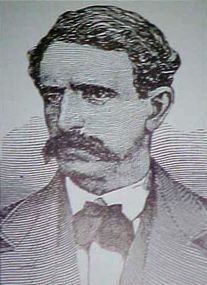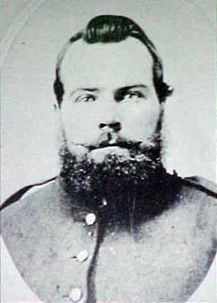
The Great Locomotive Chase was a military raid that occurred April 12, 1862, in northern Georgia during the American Civil War. Volunteers from the Union Army, led by civilian scout James J. Andrews, commandeered a train, The General, and took it northward toward Chattanooga, Tennessee, doing as much damage as possible to the vital Western and Atlantic Railroad (W&A) line from Atlanta to Chattanooga as they went. They were pursued by Confederate forces at first on foot, and later on a succession of locomotives, including The Texas, for 87 miles (140 km).

Jacob Wilson Parrott was an American soldier and carpenter. He was the first recipient of the Medal of Honor, a new military award first presented by the United States Department of War to six Union Army soldiers who participated in the Great Locomotive Chase in 1862 during the American Civil War (1861–1865).

The 104th Ohio Infantry Regiment, sometimes 104th Ohio Volunteer Infantry, was an infantry regiment in the Union army during the American Civil War. It played a conspicuous role at the Battle of Franklin during the 1864 Franklin–Nashville campaign, where six members later received the Medal of Honor, most for capturing enemy flags.

The 33rd Ohio Infantry Regiment was an infantry regiment in the Union Army during the American Civil War.
The 30th Ohio Infantry Regiment was an infantry regiment in the Union Army during the American Civil War.

Elihu Harlam Mason was a Union Army soldier in the American Civil War and a recipient of the United States military's highest decoration, the Medal of Honor, for his actions in the Great Locomotive Chase.

William Pittenger was an American soldier during the American Civil War. A member of the Union Army, he was one of the first recipients of the Medal of Honor.
The 127th Regiment, Illinois Volunteer Infantry was an infantry regiment in the Union Army during the American Civil War.

Wilson Wright Brown was a soldier and recipient of the Medal of Honor for his role in the Great Locomotive Chase during the American Civil War.

William Bensinger was an American soldier who fought for the Union in the American Civil War. On March 25, 1863, he was the second person given the country's highest award for bravery during combat, the Medal of Honor, for his actions during the Great Locomotive Chase in Georgia in April 1862.

Daniel Allen Dorsey was an American soldier who fought in the American Civil War. Dorsey received the country's highest award for bravery during combat, the Medal of Honor, for his action during the Great Locomotive Chase in Georgia in April 1862. He was honored with the award on 17 September 1863.

Robert Buffum was an American soldier who fought in the American Civil War. Buffum was the third person to receive the country's highest award for bravery during combat, the Medal of Honor, for his action during the Great Locomotive Chase in Georgia in April 1862. He was honored with the award on 25 March 1863.

Martin Jones Hawkins was a Union Army officer in the American Civil War who received the U.S. military's highest decoration, the Medal of Honor.

Philip Gephart Shadrach was an American soldier who was executed in 1862 for his participation in the Great Locomotive Chase. As a result of his involvement, he was posthumously awarded a Medal of Honor by President Joseph Biden on July 3, 2024.

John Reed Porter was a recipient of the Medal of Honor, a military award presented by the United States Department of War to 18 Union Army soldiers who participated in the Great Locomotive Chase in 1862 during the American Civil War (1861–1865). He joined Union Army in 1861 and participated in the battles of Chickamauga, Stones River, Bentonville, and the campaigns of Chattanooga and Atlanta. At the end of the war he was a first lieutenant.
Addison J. Hodges was a decorated hero of the Union Army in the American Civil War. He was born in Hillsdale, Michigan.

Samuel Robertson was a private in the United States Army who was awarded the Medal of Honor for gallantry during the American Civil War. Robertson was the first American soldier posthumously awarded the Medal of Honor; he was awarded the medal in September 1863 for actions performed behind Confederate lines near Big Shanty, Georgia, in April 1862.

Marion A. Ross was a sergeant major of the United States Army who was awarded the Medal of Honor for gallantry during the American Civil War. He was posthumously awarded the medal in September 1863 for actions performed during the Great Locomotive Chase in April 1862.

Samuel Slavens was a participant in the Andrew's Raid and a recipient of the Medal of Honor.

William James Knight (1837–1916) was an American soldier, participant in the Andrews raid and Medal of Honor recipient.


















